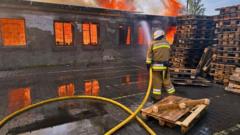Ukrainian President Zelensky and citizens express distrust, recalling previous ceasefire violations by Russia, and emphasize the need for solid guarantees to ensure their safety.
**Ukrainians Skeptical of Russia’s Proposed Ceasefire During WWII Anniversary**

**Ukrainians Skeptical of Russia’s Proposed Ceasefire During WWII Anniversary**
As Russia announces a three-day pause in fighting coinciding with World War II Victory Day, many Ukrainians view it as a superficial gesture rather than a genuine peace effort.
In a move largely dismissed by the Ukrainian populace, Russia is poised to initiate a self-declared three-day ceasefire starting Wednesday night. This announcement aligns with the upcoming Victory Day on May 9, marking 80 years since the end of World War II in Europe. President Volodymyr Zelensky described the proposal, suggested by President Vladimir Putin, as a "theatrical show" without substance, further complicating the already tense situation amid ongoing conflict.
Despite Putin's gestures, Ukraine remains skeptical, particularly as the proposed ceasefire contradicts a previous offer by the Trump administration for a more extended 30-day pause, which Ukraine accepted. Zelensky promptly rejected Russia's unilateral ceasefire, stating there would be no safety guarantees for a military parade planned in Moscow.
The prevailing sentiment among Ukrainians is one of deep distrust towards Russian intentions, as evidenced by polls indicating that approximately 95% of individuals in Ukraine do not trust their aggressor. Those living in heavily affected areas like Sumy express concerns that the shelling has recently intensified, with some residents like shopkeeper Tetyana Kondratenko stating, "I don't believe there will be any ceasefire," and recalling Russia's past tactics of using proposed truces to regroup militarily.
Meanwhile, those burdened by ongoing violence find themselves yearning for any temporary respite. In Zaporizhzhia, resident Antonina Sienina, who has lost family to Russian strikes, presented a conflicted view: while she would welcome even a day free from explosions, she insists any ceasefire must include solid guarantees for Ukraine’s safety and sovereignty.
In another troubling development, the capital city of Kyiv endured overnight airstrikes, with a ballistic missile intercepted by air defenses and a drone attack tragically resulting in civilian casualties. Observers note that Moscow's air defenses reportedly neutralized numerous Ukrainian drones, yet the Kremlin's insistence on remaining undeterred by ongoing attacks raises further questions about the legitimacy of the announced pause.
Former Ukrainian foreign minister Pavlo Klimkin asserted that this is merely an attempt by Russia to manipulate the narrative while projecting strength, suggesting it primarily serves as an internal propaganda tool rather than a meaningful gesture towards peace.
While discussions for a more comprehensive ceasefire began months ago, the current atmosphere remains rife with violence and loss. The UN has reported increased civilian fatalities, prompting varied opinions among the Ukrainian public on the subject of agreeability to any ceasefire terms, even under Russian conditions. Some believe the urgent need to save lives may necessitate difficult decisions, reflecting a complex desire for peace amid the realities of ongoing warfare.
As skepticism reigns, analysts assert Ukraine's readiness for a true ceasefire lies outside the parameters of Russia's proposed agenda. Mykhailo Samus, a military analyst, encapsulated the sentiment succinctly: “Why would we play Putin's game? We are ready for a real ceasefire."
Despite Putin's gestures, Ukraine remains skeptical, particularly as the proposed ceasefire contradicts a previous offer by the Trump administration for a more extended 30-day pause, which Ukraine accepted. Zelensky promptly rejected Russia's unilateral ceasefire, stating there would be no safety guarantees for a military parade planned in Moscow.
The prevailing sentiment among Ukrainians is one of deep distrust towards Russian intentions, as evidenced by polls indicating that approximately 95% of individuals in Ukraine do not trust their aggressor. Those living in heavily affected areas like Sumy express concerns that the shelling has recently intensified, with some residents like shopkeeper Tetyana Kondratenko stating, "I don't believe there will be any ceasefire," and recalling Russia's past tactics of using proposed truces to regroup militarily.
Meanwhile, those burdened by ongoing violence find themselves yearning for any temporary respite. In Zaporizhzhia, resident Antonina Sienina, who has lost family to Russian strikes, presented a conflicted view: while she would welcome even a day free from explosions, she insists any ceasefire must include solid guarantees for Ukraine’s safety and sovereignty.
In another troubling development, the capital city of Kyiv endured overnight airstrikes, with a ballistic missile intercepted by air defenses and a drone attack tragically resulting in civilian casualties. Observers note that Moscow's air defenses reportedly neutralized numerous Ukrainian drones, yet the Kremlin's insistence on remaining undeterred by ongoing attacks raises further questions about the legitimacy of the announced pause.
Former Ukrainian foreign minister Pavlo Klimkin asserted that this is merely an attempt by Russia to manipulate the narrative while projecting strength, suggesting it primarily serves as an internal propaganda tool rather than a meaningful gesture towards peace.
While discussions for a more comprehensive ceasefire began months ago, the current atmosphere remains rife with violence and loss. The UN has reported increased civilian fatalities, prompting varied opinions among the Ukrainian public on the subject of agreeability to any ceasefire terms, even under Russian conditions. Some believe the urgent need to save lives may necessitate difficult decisions, reflecting a complex desire for peace amid the realities of ongoing warfare.
As skepticism reigns, analysts assert Ukraine's readiness for a true ceasefire lies outside the parameters of Russia's proposed agenda. Mykhailo Samus, a military analyst, encapsulated the sentiment succinctly: “Why would we play Putin's game? We are ready for a real ceasefire."






















